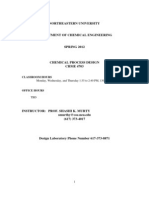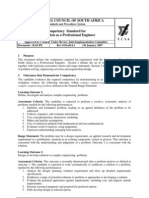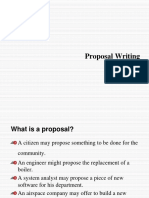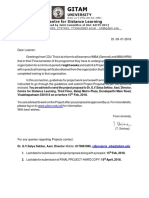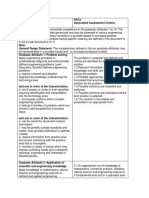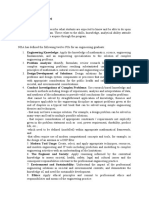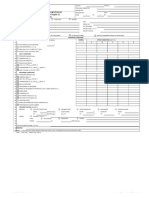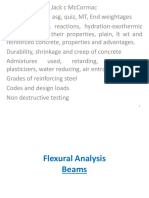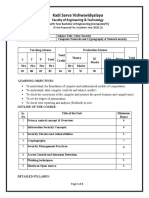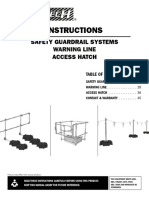0 ratings0% found this document useful (0 votes)
39 viewsFakulti Kejuruteraan: Course Code: Course Name: Lecturer: Credit Hour: Session
Fakulti Kejuruteraan: Course Code: Course Name: Lecturer: Credit Hour: Session
Uploaded by
Kit Meng LimThis document provides information for an individual assignment for the course "Ethics and Law for Engineers" including:
- The assignment requires students to write a technical report on an assigned topic related to ethics in engineering following a specific format.
- The report should include an abstract, introduction, methodology, results and discussion, and conclusion following the outlined structure and addressing criteria like standards and procedures.
- Students must submit their paper online by the due date and late submissions will be penalized.
- The document lists 40 potential topics that students may be assigned related to ethics, decision making, health and safety, intellectual property, and professional conduct for engineers.
Copyright:
© All Rights Reserved
Available Formats
Download as PDF, TXT or read online from Scribd
Fakulti Kejuruteraan: Course Code: Course Name: Lecturer: Credit Hour: Session
Fakulti Kejuruteraan: Course Code: Course Name: Lecturer: Credit Hour: Session
Uploaded by
Kit Meng Lim0 ratings0% found this document useful (0 votes)
39 views2 pagesThis document provides information for an individual assignment for the course "Ethics and Law for Engineers" including:
- The assignment requires students to write a technical report on an assigned topic related to ethics in engineering following a specific format.
- The report should include an abstract, introduction, methodology, results and discussion, and conclusion following the outlined structure and addressing criteria like standards and procedures.
- Students must submit their paper online by the due date and late submissions will be penalized.
- The document lists 40 potential topics that students may be assigned related to ethics, decision making, health and safety, intellectual property, and professional conduct for engineers.
Original Description:
just reference
Original Title
18-19.01.KA08803.ELE_.003.01.Assignment (1)
Copyright
© © All Rights Reserved
Available Formats
PDF, TXT or read online from Scribd
Share this document
Did you find this document useful?
Is this content inappropriate?
This document provides information for an individual assignment for the course "Ethics and Law for Engineers" including:
- The assignment requires students to write a technical report on an assigned topic related to ethics in engineering following a specific format.
- The report should include an abstract, introduction, methodology, results and discussion, and conclusion following the outlined structure and addressing criteria like standards and procedures.
- Students must submit their paper online by the due date and late submissions will be penalized.
- The document lists 40 potential topics that students may be assigned related to ethics, decision making, health and safety, intellectual property, and professional conduct for engineers.
Copyright:
© All Rights Reserved
Available Formats
Download as PDF, TXT or read online from Scribd
Download as pdf or txt
0 ratings0% found this document useful (0 votes)
39 views2 pagesFakulti Kejuruteraan: Course Code: Course Name: Lecturer: Credit Hour: Session
Fakulti Kejuruteraan: Course Code: Course Name: Lecturer: Credit Hour: Session
Uploaded by
Kit Meng LimThis document provides information for an individual assignment for the course "Ethics and Law for Engineers" including:
- The assignment requires students to write a technical report on an assigned topic related to ethics in engineering following a specific format.
- The report should include an abstract, introduction, methodology, results and discussion, and conclusion following the outlined structure and addressing criteria like standards and procedures.
- Students must submit their paper online by the due date and late submissions will be penalized.
- The document lists 40 potential topics that students may be assigned related to ethics, decision making, health and safety, intellectual property, and professional conduct for engineers.
Copyright:
© All Rights Reserved
Available Formats
Download as PDF, TXT or read online from Scribd
Download as pdf or txt
You are on page 1of 2
FAKULTI KEJURUTERAAN
COURSE CODE: KA08803
COURSE NAME: Ethics and Law for Engineers
LECTURER: Prof Ir Dr Abdul Karim bin Mirasa (akmirasa@ums.edu.my)
Sr. Asmawan Mohd Sarman (asmawan@ums.edu.my)
CREDIT HOUR: 3 (2-hour lecture and 1-hour tutorial)
SESSION: Sem. 1 - 2018/2019
INDIVIDUAL ASSIGNMENT (IA) (Submission - 24/10/2018 – 12:00pm or before)
1. Please read and use the Individual Assignment Technical Report Format to write your paper. Failure
to follow this format will be given a mark penalty.
2. Student having similar topic and copying contents with others will be penalized.
3. Please ensure that you have the following data;
a. Criteria.
b. Elements.
c. Standards and Procedure
d. Method
e. Checklist
f. Advantages and Disadvantages
g. Systems
4. In general, the IA report should contain the followings:
a. Abstract: The abstract should state briefly the purpose of the report, the essential new
information, the principal results and major conclusions. The abstract must be able to
stand-alone and references to the report should therefore be avoided. Maximum of 5
keywords (words which appear with statistically unusual frequency in a text, or main topic
of the report). Ideally, abstract is a summary for your 5 page report so it should be
written last.
b. Introduction: Introduce the construction project (refer to IA topic). Definitions /
Terminology / Common problems / Summarize the major contributions of past
investigation, studies and articles related to the project and methodology. You are
encouraged to do journal reference about site selection (especially for sensitive projects),
soil classification systems and soil compaction. Lastly, state and justify the objectives of
the investigation.
c. Methodology: A particular procedure or set of procedures used in collection data and
analysis. Explanation of how the investigations were conducted (methods), explanation of
how data was analyzed, explanation of methodological problems and their solutions or
effects.
d. Result and Discussion: Result based on research methodology. Can be summarized in
table. Can be presented in chart / graph / figure. Refer to data list in no No 4 .Discuss and
interpret each result.
e. Conclusion and Recommendation: Summarize the major findings and
recommendations. Summarize the achievement of the objectives stated in 5b. State
which location would you proposed for the project.
f. Acknowledgement (Optional): Acknowledge the persons / parties that helped you in
preparation of the report.
g. References: List the journals references (using proper format) in alphabetical order.
5. Submit online at Schoology and printed hardcopy to lecturer’s office before the due date. Late
submission will be penalized.
6. Submit with appropriate File Name – e.g. 18-19.01.KA08803.ELE.BK??????.NAME.Ethics in
Construction Decision Making.
7. Topics
1. Ethics and Solving Ethical Problems
2. Ethics and Decision Making In Construction
3. Trust and Reliability
4. Conflicts of Interest
5. Risk and Liability
6. Hazard Assessment and Design Risk Management
7. The Legal Justice System and Malaysian Law
8. Tort Law – Features
9. Health and Safety Culture in Construction
10. Sustainability and Environmental Responsibility – Assessment and Management
11. Competition Laws and Monopolies
12. Intellectual Property Rights
13. Engineers and principles.
14. Engineer’s ethics in sustainable development in the performance of their professional duties.
15. Engineers and competence.
16. Engineers and public statements.
17. Engineers and professionalism to employer or client.
18. Engineers and professional reputation.
19. Engineers and honor, integrity, and dignity
20. Engineers and act with zero-tolerance for bribery, fraud, and corruption.
21. Engineers and professional development of those engineers under their supervision.
22. Registered Professional Engineer with Practising Certificate not to falsify qualification.
23. Registered Professional Engineer with Practising Certificate to certify work only if he has
control over supervision
24. Registered Professional Engineer with Practising Certificate not to accept benefit from more
than one party
25. Accepting gifts/favours in exchange for preferential treatment
26. Undertaking work in an area you know little about
27. Passing blame for errors to an innocent co-worker
28. Not supporting a colleague who is trying to do the right thing
29. Giving gifts/favours in exchange for preferential treatment
30. Claiming credit for someone else's work
31. Not reporting others' violations of organisation policies
32. Divulging confidential information
33. Withholding relevant information from a colleague or client
34. Calling in sick to take a day off
35. Pilfering organisation material and supplies
36. Doing personal business on organisation time
37. Not keeping up to date with the latest developments in your area
38. Concealing one's errors
39. Taking extra personal time (lunch hours, breaks, early departure)
40. Using organisation services for personal use
You might also like
- MDX Online MBA Project - IntroDocument17 pagesMDX Online MBA Project - Introkshamamba2324No ratings yet
- Tribhuvan University Bachelor of Science in Computer Science and Information TechnologyDocument8 pagesTribhuvan University Bachelor of Science in Computer Science and Information TechnologyKnowledge and WisdomNo ratings yet
- Guideline For Capstone Project 2015-17Document8 pagesGuideline For Capstone Project 2015-17Prashant DabralNo ratings yet
- Research Project GuidelinesDocument8 pagesResearch Project GuidelinesPRAKHAR KAUSHIKNo ratings yet
- Project DetailDocument2 pagesProject DetailmuralioooooNo ratings yet
- Guidline of Capston Project 10 - 11Document6 pagesGuidline of Capston Project 10 - 11agarwalhoneyNo ratings yet
- Unit 13 Computing Research Project - New 2022Document9 pagesUnit 13 Computing Research Project - New 2022Ayush MaharjanNo ratings yet
- Research Project GuidelinesDocument8 pagesResearch Project GuidelinesHARSH GUPTANo ratings yet
- CHME 4703 SP2012 SyllabusDocument9 pagesCHME 4703 SP2012 SyllabusFrank PiccirilloNo ratings yet
- Research Manual May2014Document23 pagesResearch Manual May2014Bernard Pilla Susbilla100% (1)
- Project Work GuidelinesDocument6 pagesProject Work GuidelinesSagar ModiNo ratings yet
- Aum ProjectDocument10 pagesAum Projecte_darwishNo ratings yet
- BBA BMS Research Project - GuidelinesDocument6 pagesBBA BMS Research Project - GuidelinesNipun AgarwalNo ratings yet
- PDFDocument8 pagesPDFSaranya RajeshkumarNo ratings yet
- Major Project Guidelines SIMSRDocument10 pagesMajor Project Guidelines SIMSRsujatassukhdhanNo ratings yet
- Investigatory Project PartsDocument14 pagesInvestigatory Project PartsDenfer Dizon0% (2)
- General Guidelines For Undergraduate Research Capstone Project Revised 2021Document6 pagesGeneral Guidelines For Undergraduate Research Capstone Project Revised 2021Althea Marie AvilaNo ratings yet
- Format of Research ProposalDocument1 pageFormat of Research ProposalHường NguyễnNo ratings yet
- UIAMS Summer Internship Guidelines 2023-25Document5 pagesUIAMS Summer Internship Guidelines 2023-25gurtejtestingNo ratings yet
- Assignment Design PrinciplesDocument9 pagesAssignment Design PrincipleskashifNo ratings yet
- Dissertation Handbook PDFDocument29 pagesDissertation Handbook PDFrakeshk_07No ratings yet
- Guidelines For Project Report - UpdatedDocument11 pagesGuidelines For Project Report - UpdatedRishabh GuptaNo ratings yet
- BBA-CAM 3rd Semester) : Both. Each Student Is Required To Carry Out The Work and Submit The Report IndividuallyDocument11 pagesBBA-CAM 3rd Semester) : Both. Each Student Is Required To Carry Out The Work and Submit The Report IndividuallyMatthew HughesNo ratings yet
- Bda Lab Manual (R20a0592)Document89 pagesBda Lab Manual (R20a0592)brigcse5No ratings yet
- Bda Lab Manual (R20a0592)Document89 pagesBda Lab Manual (R20a0592)Dhanalakshmi DNo ratings yet
- Project GuidelinesDocument20 pagesProject Guidelinesbatkrushnasahoo15No ratings yet
- Capstone Project DetailsDocument5 pagesCapstone Project DetailsGerald AroNo ratings yet
- StudentHandout InstrumentationAndProcessControlDocument8 pagesStudentHandout InstrumentationAndProcessControlpratham.pch21No ratings yet
- ProjectWorks DetailingDocument9 pagesProjectWorks DetailingsankalpaNo ratings yet
- Engineering Council of South Africa: 1 PurposeDocument5 pagesEngineering Council of South Africa: 1 Purpose2lieNo ratings yet
- Untitled DocumentDocument3 pagesUntitled Documentharish7993094894No ratings yet
- Guidelines in Preparing The Information Systems Capstone ProjectDocument12 pagesGuidelines in Preparing The Information Systems Capstone ProjectJov Vito Jr.No ratings yet
- HM 102 Lecture 23 & 24Document19 pagesHM 102 Lecture 23 & 24Hasnain KhanNo ratings yet
- Software Testing LAB MANUALDocument126 pagesSoftware Testing LAB MANUALHardik KundraNo ratings yet
- Project Report Format 2019-2021Document8 pagesProject Report Format 2019-2021CHANDER SHEKHARNo ratings yet
- Research Project Ethics Exemption Form (Signed)Document5 pagesResearch Project Ethics Exemption Form (Signed)rafter150No ratings yet
- DWDM Lab Manual - It - Iii-Ii - 2018-19 PDFDocument96 pagesDWDM Lab Manual - It - Iii-Ii - 2018-19 PDFs krishna raoNo ratings yet
- Study Guide ECDS301 - 2024Document13 pagesStudy Guide ECDS301 - 2024Mazwe HlafunaNo ratings yet
- BLD 213 Lecture NoteDocument32 pagesBLD 213 Lecture NoteJoel NdubuisiNo ratings yet
- Senior Project and Thesis GuidelineDocument7 pagesSenior Project and Thesis GuidelineLê Trí ThànhNo ratings yet
- Report WritingDocument4 pagesReport WritingAbrar Alam ChowdhuryNo ratings yet
- Prop Format Oral ThesisDocument7 pagesProp Format Oral ThesisdhiyamirzaNo ratings yet
- CH - 04Document33 pagesCH - 04Arif AbdulelamNo ratings yet
- Guidelines For Project Report - CommonDocument11 pagesGuidelines For Project Report - CommonNeel Sheth0% (1)
- GITAM Guidelines For MBA Project Work - 2018Document6 pagesGITAM Guidelines For MBA Project Work - 2018Telika RamuNo ratings yet
- Ksef Workshops 2024Document42 pagesKsef Workshops 2024lucynyambura033No ratings yet
- Investigatory Project PlanDocument6 pagesInvestigatory Project PlanSanchezjane HelmieNo ratings yet
- Policies and Guidlines For RMADocument6 pagesPolicies and Guidlines For RMACapNo ratings yet
- UNIT 4 Technical CommunicationDocument15 pagesUNIT 4 Technical Communicationupadhyaydevansh55No ratings yet
- ELO and GA With Range StatementDocument8 pagesELO and GA With Range StatementJuandre Van EedenNo ratings yet
- Program Outcomes (PO's) DefinitionDocument2 pagesProgram Outcomes (PO's) DefinitionPiyush BhandariNo ratings yet
- Project Presentation MBADocument14 pagesProject Presentation MBASumitNo ratings yet
- Instructions For Research Proposal Construction Biomedical Sciences Program, Faculty of Allied Health SciencesDocument5 pagesInstructions For Research Proposal Construction Biomedical Sciences Program, Faculty of Allied Health SciencesEversley AlbertNo ratings yet
- EE 311-Projects-Fall 2020Document9 pagesEE 311-Projects-Fall 2020Shehab AshrafNo ratings yet
- Bba - Guidelines For Project Work - SgvuDocument5 pagesBba - Guidelines For Project Work - SgvuKrishna sainiNo ratings yet
- Successful Instrumentation and Control Systems Design, Second EditionFrom EverandSuccessful Instrumentation and Control Systems Design, Second EditionRating: 4.5 out of 5 stars4.5/5 (11)
- Field Methods for Academic Research: Interviews, Focus Groups & QuestionnairesFrom EverandField Methods for Academic Research: Interviews, Focus Groups & QuestionnairesNo ratings yet
- Q & As for the PMBOK® Guide Sixth EditionFrom EverandQ & As for the PMBOK® Guide Sixth EditionRating: 4.5 out of 5 stars4.5/5 (18)
- Expert Judgment in Project Management: Narrowing the Theory-Practice GapFrom EverandExpert Judgment in Project Management: Narrowing the Theory-Practice GapNo ratings yet
- Hydraulic Assgn LDocument14 pagesHydraulic Assgn LKit Meng Lim100% (1)
- Material CostDocument6 pagesMaterial CostKit Meng LimNo ratings yet
- 5 ConferencePaperInvestigationofElectuseefficencyofFUTmxCampusDocument10 pages5 ConferencePaperInvestigationofElectuseefficencyofFUTmxCampusKit Meng LimNo ratings yet
- KA30603 Lecture 2b Load DistributionDocument12 pagesKA30603 Lecture 2b Load DistributionKit Meng LimNo ratings yet
- Proposal Clean ODECDocument9 pagesProposal Clean ODECKit Meng LimNo ratings yet
- Guideline For PESP Applicants 2018Document26 pagesGuideline For PESP Applicants 2018Kit Meng LimNo ratings yet
- The Title of Your Individual AssignmentDocument4 pagesThe Title of Your Individual AssignmentKit Meng LimNo ratings yet
- Fakulti Kejuruteraan: E-Learning Group AssignmentDocument4 pagesFakulti Kejuruteraan: E-Learning Group AssignmentKit Meng LimNo ratings yet
- Excel Gantt Chart Template TeamGanttDocument21 pagesExcel Gantt Chart Template TeamGanttKit Meng LimNo ratings yet
- Principles of Electric Circuits, Conventional Flow, 9 EdDocument26 pagesPrinciples of Electric Circuits, Conventional Flow, 9 EdKit Meng LimNo ratings yet
- Ranks: Group N Mean Rank Sum of Ranks Tensile - Stress 6mm 22 24.95 549.00 12mm 26 24.12 627.00 Total 48Document1 pageRanks: Group N Mean Rank Sum of Ranks Tensile - Stress 6mm 22 24.95 549.00 12mm 26 24.12 627.00 Total 48Kit Meng LimNo ratings yet
- Chapter 2Document40 pagesChapter 2Kit Meng LimNo ratings yet
- Chapter 1Document29 pagesChapter 1Kit Meng LimNo ratings yet
- Evaluation of Properties of Coconut Coir Fiber Reinforced Concrete PDFDocument86 pagesEvaluation of Properties of Coconut Coir Fiber Reinforced Concrete PDFKit Meng LimNo ratings yet
- Compressive Strength TestDocument7 pagesCompressive Strength TestKit Meng LimNo ratings yet
- LaplaceTable PDFDocument1 pageLaplaceTable PDFKit Meng LimNo ratings yet
- V2.0 OBE Format KA20502 Differential Equation 2016 - 2017 Sem 1Document2 pagesV2.0 OBE Format KA20502 Differential Equation 2016 - 2017 Sem 1Kit Meng LimNo ratings yet
- Final Thesis Abdi Majid Mohamed HassanDocument26 pagesFinal Thesis Abdi Majid Mohamed HassanAbdi Majid Mohamed Hassan100% (1)
- On-Device, Real-Time Hand Tracking With MediaPipeDocument9 pagesOn-Device, Real-Time Hand Tracking With MediaPipedipsonbhujel1025No ratings yet
- Upgrading The Ict Questionnaire Items in Pisa 2021Document49 pagesUpgrading The Ict Questionnaire Items in Pisa 2021magda caicedoNo ratings yet
- Poster WPVDocument1 pagePoster WPVapi-606704098No ratings yet
- Inventory ControlDocument35 pagesInventory ControlSamis NoNo ratings yet
- Cold ReadingDocument146 pagesCold ReadinglololNo ratings yet
- Đề ôn 02 - OT10 C2 G8 MCQ 036Document4 pagesĐề ôn 02 - OT10 C2 G8 MCQ 036Phuong Linh NguyenNo ratings yet
- Dehydration of Crystalline MnSO4 4H2ODocument10 pagesDehydration of Crystalline MnSO4 4H2OrichardNo ratings yet
- The Korean Semiconductor IndustryDocument56 pagesThe Korean Semiconductor IndustryYuDingNo ratings yet
- Sample ProblemsDocument53 pagesSample ProblemsMay Ann100% (1)
- Blue Geometric Robotics Engineering ResumeDocument1 pageBlue Geometric Robotics Engineering ResumeSaketh kotlaNo ratings yet
- Centrifugal and Axial Compressor DATA SHEET (API 617-7TH Chapter 2) SI UNITS (1-1.6.5)Document9 pagesCentrifugal and Axial Compressor DATA SHEET (API 617-7TH Chapter 2) SI UNITS (1-1.6.5)tutuionutNo ratings yet
- A Checklist For Migrating Big Iron Cobol ApplicationsDocument13 pagesA Checklist For Migrating Big Iron Cobol ApplicationsCognizantNo ratings yet
- Prc-I Lec 7 - 18th March 014 - Flexural Analysis of BeamsDocument51 pagesPrc-I Lec 7 - 18th March 014 - Flexural Analysis of BeamsDavidm AndosNo ratings yet
- ContinueDocument2 pagesContinue11 1No ratings yet
- AB Enzymes C.o.a-Delivery 32190728 900001Document1 pageAB Enzymes C.o.a-Delivery 32190728 900001Ali KhanNo ratings yet
- Abdul Moiz Satti Iict Assignment # 3Document14 pagesAbdul Moiz Satti Iict Assignment # 3SumreenSattiNo ratings yet
- APA102-2020 LED DatasheetDocument16 pagesAPA102-2020 LED DatasheetDaisyNo ratings yet
- CE 111 Civil Engineering Orientation 2.0 Units - TOPIC 1Document8 pagesCE 111 Civil Engineering Orientation 2.0 Units - TOPIC 1Jasper Kyle GuinsimanNo ratings yet
- CT702-N Cyber SecurityDocument4 pagesCT702-N Cyber SecurityDevanshNo ratings yet
- Lighting and Rendering 3D Models - INTLDocument129 pagesLighting and Rendering 3D Models - INTLBình PhạmNo ratings yet
- Dokumen - Tips - Wood Group Sps Surface Pumping SystemsDocument7 pagesDokumen - Tips - Wood Group Sps Surface Pumping SystemsHussein A.No ratings yet
- Maths N2Document6 pagesMaths N2Anesu MasirahaNo ratings yet
- Battery Load Cycle-23.04.10Document12 pagesBattery Load Cycle-23.04.10Navneet SinghNo ratings yet
- Instructions SGA enDocument45 pagesInstructions SGA enMarco TailleferNo ratings yet
- Quick and Economic Setups JitDocument2 pagesQuick and Economic Setups JitDharshan KofiNo ratings yet
- Manual Motor de Pistones Radiales CA Bosch RexrothDocument64 pagesManual Motor de Pistones Radiales CA Bosch RexrothOlegNo ratings yet
- Tutorial 7 1Document2 pagesTutorial 7 1GSaurav DahalNo ratings yet
- Chapter 4: Coaching, Counseling and Supportive CommunicationDocument20 pagesChapter 4: Coaching, Counseling and Supportive CommunicationsamrulezzzNo ratings yet
- Resume AnuDocument5 pagesResume AnuAnupam karwasraNo ratings yet








